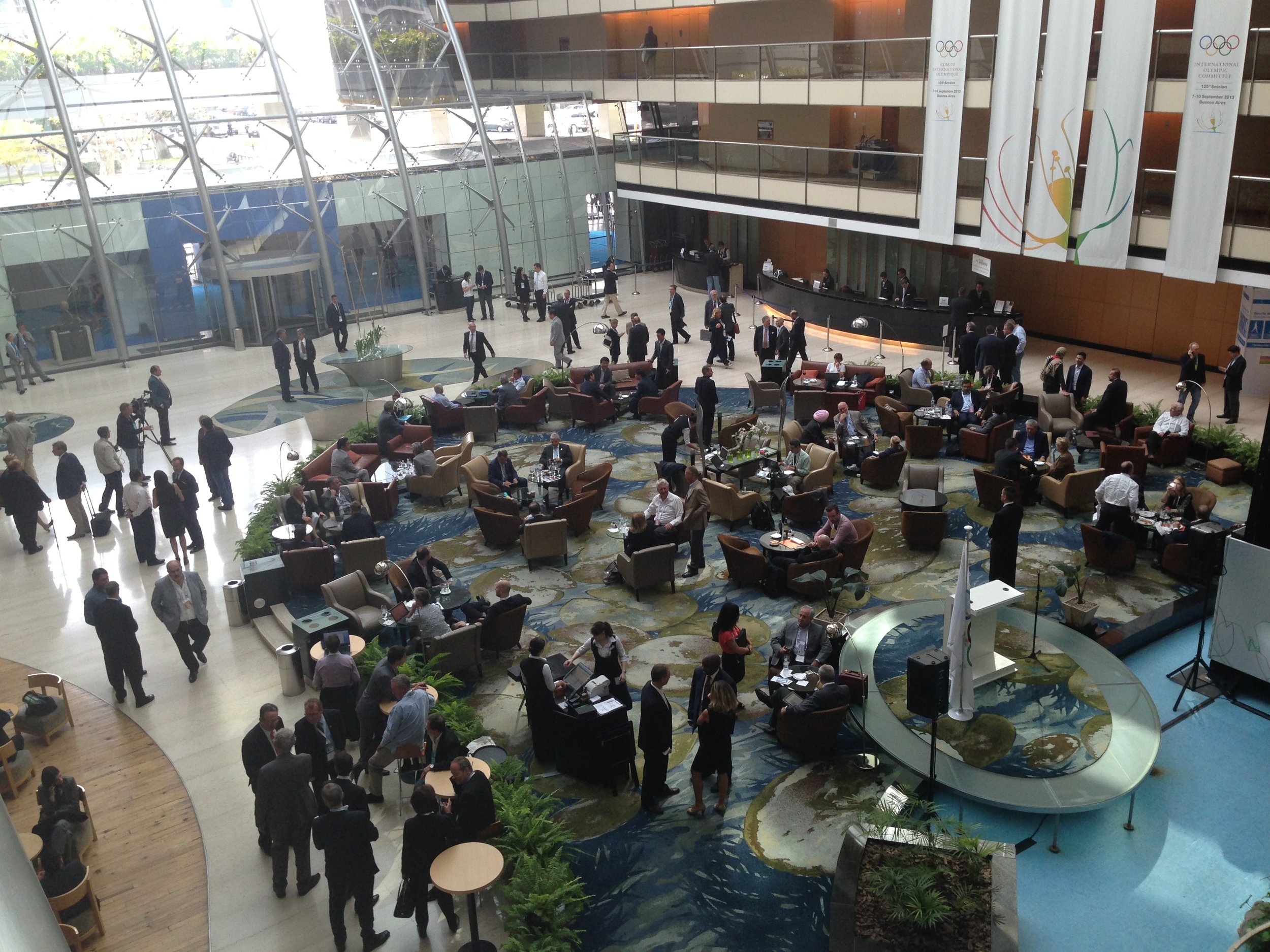The International Olympic Committee finds itself early this week in Oslo in a conundrum of its own making. On the one hand, it is assuredly the IOC’s responsibility to encourage strong bids to come forward. Thus Oslo 2022. On the other, in politics – even, perhaps especially, sports politics – perceptions can matter as much as reality. Thus, again, Oslo 2022.
A high-powered IOC delegation, led by the president himself, Thomas Bach, visits Norway Monday and Tuesday for a series of meetings revolving primarily – there are other sessions – around preparations for the 2016 Winter Youth Games in Lillehammer.
The timing comes at a fraught juncture for the Oslo 2022 bid, which all involved are keenly aware.
Thus the dilemma:
Is this good for the IOC? For Oslo 2022? Or, owing to layers of complexities, is this trip ultimately not likely to prove helpful for an Oslo 2022 campaign?
To set the stage:
The IOC agreed to these series of meetings in Norway weeks if not months ago.
As the longtime Olympic British journalist David Miller spelled out in the newsletter Sport Intern in a column published Saturday, the two-day itinerary begins Monday with meetings at the Olympic Sports Center and the Norwegian School of Sports Science.
The IOC president is due thereafter to take lunch with Norway’s King Harald at the Royal Castle along with Norway IOC member, Gerhard Heiberg. After that, Miller reports, the IOC delegation – which includes the likes of senior IOC member Ser Miang Ng, who is the new finance commission chair as well as Singapore’s ambassador to Norway for many years, and Angela Ruggiero, chair of the Lillehammer 2016 coordination commission – is due to “exchange ideas” with Norway’s culture minister, Thorhild Wedvey, and Oslo’s mayor, Stian Berger Rosland.
More meetings Monday are due to follow, with three NGOs, with four labor groups and, finally, with members of parliament.
On Tuesday, the scene shifts to Lillehammer itself, Miller reports, for a series of meetings, including with Ottavio Cinquanta (head of the skating federation), Rene Fasel (hockey federation chief) and Gian-Franco Kasper (ski and snowboard federation No. 1).
Also due to be on-hand from the IOC side, according to Miller: the outgoing Olympic Games executive director, Gilbert Felli, and the IOC director general, Christophe de Kepper.
Wow.
Assuming, indeed, that everyone shows up -- that is some serious IOC star power.
A bit more background:
There are five applicant cities in the 2022 bid race: Oslo; Almaty, Kazakhstan; Beijing; Lviv, Ukraine; and Krakow, Poland.
It’s not clear Krakow will make it past a May 25 referendum.
Lviv, of course, is struggling with enormous turbulence in the eastern part of the country. The IOC last week gave Ukraine’s national Olympic committee $300,000 just so its athletes could make it to training camps and meets this year.
The IOC’s policy-making executive board is due in early July to decide which of the five “applicants” will become “candidate” finalists. The IOC will pick the 2022 winner in July, 2015.
Almaty and Beijing would seem to be shoo-ins. They are both, of course, from Asia.
So who is going to make it from Europe?
It’s not exactly a secret that Norwegians love winter sports, indeed the Winter Games. The 1994 Lillehammer Games are often cited as the “best-ever.” Norway leads the overall Winter Games medal count, with 329, and the gold count, too, with 118 (the U.S. is second in both categories, 282 and 96).
The athlete who has won the most Winter Games medals? Biathlon king Ole Einar Bjorndalen of Norway, the new IOC member, with 13. He won two gold medals in Sochi in February -- just a couple weeks after turning 40.
Next? Cross-country ski god Bjorn Daehlie of Norway, with 12, eight gold.
Next, three athletes, one of whom is female Norwegian cross-country ski legend Marit Bjorgen, with 10 Olympic medals, six gold. In Sochi, age 33, she won three gold medals, among them the grueling 30-kilometer event.
Look, any Oslo bid for the Games would understandably be taken very seriously. For obvious reasons.
Two weeks ago, however, one of two Norwegian government parties voted against supporting Oslo’s 2022 bid. At issue now is whether the government will offer the needed financial guarantees.
The imperative – at least for now – is that the IOC would seem to need Oslo for the 2022 race more than Oslo needs the Winter Games. That is the box. And everyone in Olympic circles knows it.
At the same time, while Norwegians may love the Winter Games, it’s pretty clear there are some strong feelings about the bid, and they may be directly tied to the IOC. And those feelings may not be so positive.
A new poll conducted by the research firm Norstat for NRK, the Norwegian Broadcast Corporation, suggests that 60 percent of the Norwegian public is against an Oslo 2022 bid – with only 35 percent in favor.
“No, it is a considerable skepticism, and I think a lot of the information that has been around the IOC has increased that skepticism,” Christian Democratic Party leader Knut Arild Hareide said.
Bach has been in office for about nine months. He has shown an inclination to lead in a style that evokes some of the ways of Juan Antonio Samaranch, the IOC president from 1980-2001, who understood – appropriately – that the IOC is not just a sports institution but one that moves with nation-states and with influential political leaders.
Thus, for instance, the lunch with the Norwegian king as well as the exchanges with, for instance, the culture minister.
Too, Bach is possessed – this is meant to be a compliment – of first-rate confidence. You have to have such confidence to direct the IOC, a global institution with a multibillion-dollar budget. By definition, the position lends itself to high-pressure decision making. Bach took a decision to have this two-day meeting, and it is on.
He is also riding a wave of can-do. Sochi is in the rear-view mirror. The IOC and NBC just struck a $7.75 billion deal through 2032.
Even so, does the IOC president himself need to assess what’s going on in Lillehammer with regard to the 2016 Youth Games, when those Games are nearly two years away -- Feb. 12-21, 2016 -- and, besides, it’s well-known the Youth Games are way down the IOC priority list?
For this purpose, doesn’t he already have a coordination commission? And the chair of that commission is, you know, in Norway for this trip?
If this trip were just about Lillehammer, why meet with the mayor of Oslo?
It is also the case that the Norwegians doubtlessly would have some interesting – perhaps even some constructively provocative – ideas to offer regarding Olympic Agenda 2020, the far-reaching IOC study program the IOC president has launched that is now working its way toward the all-members session in Monaco in December. That would explain the sessions with the NGOs and the other Monday afternoon meetings, for instance.
But are the Norwegians the only ones in the entire world with suggestions so potentially clever that the president has to hear them in person?
And, this, coincidentally enough, before the July meeting at which the 2022 applicants are going to be passed through?
Earlier this year – the deadline was April 15 – the IOC took email submissions from anyone, anywhere who wanted to weigh in relating to Olympic Agenda 2020. Yet the Norwegians get an in-person audience with the IOC president himself?
Over the years, the IOC has gone to great – some would say extraordinary – lengths, particularly in the aftermath of the late 1990s Salt Lake City scandal, to keep its distance from anything that sniffed of even the hint of the appearance of conflict of interest in the bid cycle.
For instance, the IOC would not entertain sponsorship discussions from the Russian concern Gazprom while Sochi was bidding for the 2014 Games. Similarly, when Doha was trying, it would not entertain an approach from Qatar Airways even between bid cycles.
No one has suggested misconduct or wrongdoing in the slightest by either the Norwegians or the IOC. To repeat: nobody has said anybody is doing anything wrong.
And nobody is likely to.
The only people who would be likely to complain would be rival bid teams, in this instance most likely Almaty or Beijing.
How do you think it is going to go over when they read that the IOC president is in Oslo, and before the July executive board pass-through meeting?
If you were them, how would you react?
In private?
Now – what would you do about it?
Exactly.
Isn’t this, too, the dilemma?






